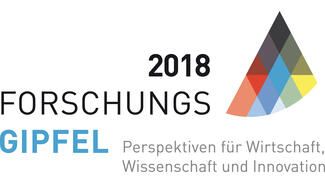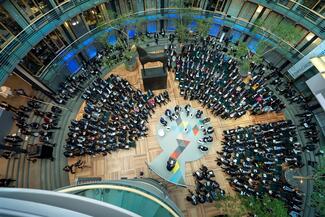
The aim of the Research Summit 2018 was to come together to formulate answers to some of the most pressing questions in German research- and innovation policy. Should the government think of itself as a visionary and innovator (an entrepreneurial state)? Why does German enterprise not generate radical innovations? Can today's EU still have an influence by taking initiatives in innovation policy?
As in previous years, it was imperative to jointly develop perspectives for the future of the German research and innovation system, and to provide orientation for strategic decisions in anticipation of the coming legislative periods and the next EU Research Framework Program. The Research Summit provided the appropriate framework for this demanding undertaking: as an international arena for critical and constructive dialogue, as an interdisciplinary forum for reflection and brainstorming, and as a lively venue for networking.
Future Prospects: Research- and Innovation Policy in Germany and Europe
The German research and innovation system has been developing in a positive direction for years. Moreover, Germany’s economic growth generates the resources needed in order to systematically develop the research and innovation system. This solid foundation should be used to make strong and courageous decisions on the future trajectory of German research- and innovation policy and to develop Germany’s future perspectives. It must be understood that this path will extend well beyond one legislative period: the great societal and technological challenges represent not only a long-term task for science, business, civil society, and politics, but also require a joint strategic approach for the future. The Research Summit 2018 was the forum for presenting Germany’s research- and innovation-policy prospects and for discussing their realization.
Inner Circle 1
The German research and innovation system is very well positioned by international comparison. In addition to a booming economy and a sound national budget, there is a broad consensus on many matters of research policy – be it on the 3.5 percent target, on R&D funding for SMEs through tax credits, or on the rising importance of venture capital. The conditions are good for using the next years not only to implement decisions that have already been made, but also to develop new, far-reaching perspectives and political initiatives; these good prospects must not be wasted by sitting back waiting. The Research Summit 2018 provided the first opportunity for representatives from science, business, civil society, and politics after Germany’s federal elections to present their visions on the further development of the German research and innovation system in a broader setting and to jointly develop additional perspectives. This also included the presentation of technoscience scenarios developed by science-fiction authors and futurologists, which are not usually featured in the context of policy development in research and innovation.
Inner Circle 2
One key challenge facing Germany is how to deal with radical innovations. Recently, these have been generated almost exclusively in other countries. Although Germany’s specialization in evolutionary and low-risk innovations in established industries and services is partially responsible for the country’s good economic situation, Germany would be running a massive risk if it were to close itself off from radical new technologies and failed to participate in their further development. In such a case, Germany would risk the loss of established industries without profiting from new, lucrative industries and services. Although this threat has been recognized, there is no strategy for counteracting this problem. The Research Summit 2018 offered leading actors in science, business, civil society, and politics a platform on which to discuss the development of such a strategy.
Inner Circle 3
The German research and innovation system is not only the largest in Europe, it is also Europeanized to a considerable degree. Major decisions on direction and changes of the German system of innovation are thus also taken within the European structure of institutions. The fact that this institutional structure is in the midst of a major crisis makes the task of coordination more difficult. In view of shifts in economic power towards Asia, the debt crisis, and Brexit, Germany has to urgently develop perspectives together with its European partners on how European research and innovation policy can be successfully continued. In this matter, the Research Summit 2018 brought the most important German and European actors together in one panel.
Summit Format
The Research Summit 2018 took place over an entire day. The format of Inner and Extended Circles ensured the comprehensive involvement of decision makers, experts, and thought leaders.
The Inner Circle consisted of the Summit's key figures and providers of input. It was placed at the centre of the rotunda and form the event's core: the discussion arena. The participants making up the Inner Circle were chosen in relation to the three main topics which were presented in more detail below in the program.
The Extended Circle comprised all the invited guests who did not belong to one of the Inner Circles. They were able to contribute to the discussion with questions, comments or ideas. Outside the venue itself, all interested people had the chance to follow the speeches and discussions by livestream and post questions via Twitter.
Line-up
9.30 a.m.
Accreditation
10.30 a.m.
Video clip
Innovations in Germany and Europe – Opportunities and Limits of Policy-Making
10.35 a.m.
Opening remarks of the event partners
Prof. Dr. Jörg Hacker, President of the German National Academy of Sciences Leopoldina, Halle an der Saale
10.45 a.m.
Inner Circle 1: Perspectives for German Research- and Innovation Policy
Key questions:
⦁ What goals should German research- and innovation policy pursue?
⦁ Do we need a state that sees itself as a visionary and innovator (entrepreneurial state), or does such a state stifle creativity and incentives for private actors?
⦁ Can social innovation and new forms of participation contribute in a measurable way to solving social challenges, or is this politicians' wishful thinking?
Moderator
Dr. Jan-Martin Wiarda, Education and science journalist, Berlin
10.50 a.m.
Keynote speech: Germany’s Guidelines for a Future-Proof Innovation System
Anja Karliczek, Federal Minister of Education and Research, Berlin
11.10 a.m.
Panel discussion
Thomas Bachem, Founder & Chancellor of the CODE University of Applied Sciences and Founder & Member of the Board of the German Startups Association, Berlin
Prof. Dr. Heinz Bude, Chair for Macrosociology at the University Kassel, Kassel
Marc Elsberg, Science-thriller-author (Blackout, Zero, Helix), Munich/Vienna, Austria
Stefan Groschupf, Founder & CEO of SalesHero and Founder of Datameer, San Francisco, USA
Anja Karliczek, Federal Minister of Education and Research, Berlin
Dr. Joachim Kreuzburg, CEO of Sartorius, Göttingen
Prof. Dr. Ursula Staudinger, Psychologist and Founding Director of the Robert N. Butler Columbia Aging Center, Columbia University, New York, USA
Dr. Shermin Voshmgir, Founder of BlockchainHub, Berlin, and Head of Research Institute for Cryptoeconomics at Vienna University of Economics and Business, Vienna
12.00 a.m.
Lunch Break
1.15 p.m.
Inner Circle 2: Evolutionary vs. Radical Innovation: New Opportunities for Germany?
Key questions:
⦁ Why do German businesses not generate radical innovations? What are the benefits and pitfalls of concentrating on evolutionary innovation?
⦁ Must Germany generate radical innovations itself, or can they be “imported”?
⦁ Is the existing framework of innovation policy suitable for fostering radical innovation, or does it merely perpetuate established structures?
Moderator: Carsten Knop, Head of Digital Products, Frankfurter Allgemeine Zeitung, Frankfurt am Main
Keynote speech from the business sector
Werner Baumann, CEO of Bayer, Leverkusen
Impulse speech from the Extended Circle
Alexander Nowroth, Managing Partner of the Lebenswerk Consulting Group, Düsseldorf
Politician’s keynote speech – Focus on Europe
André Loesekrug-Pietri, Speaker of the Joint European Disruptive Initiative (J.E.D.I.), Paris, France
Politician’s keynote speech – Focus on Germany
Christian Hirte, State Secretary of the Federal Minister for Economic Affairs and Energy, Berlin
Impulse speech from the Extended Circle
Prof. Dr. Peter Strohschneider, President of the German Research Foundation, Bonn
Keynote speech from the scientific community
Prof. Dr. Martin Stratmann, President of the Max Planck Society for the Advancement of Science, Munich
Impulse speech from the Extended Circle
Dr. Andreas Eckert, CEO of Eckert & Ziegler Strahlen- und Medizintechnik AG, Berlin
Keynote speech from civil society
Dr. Wilhelm Krull, Secretary General of the Volkswagen Foundation, Hanover
2.20 p.m.
Panel discussion of the impulse and keynote speakers
Werner Baumann, CEO of Bayer, Leverkusen
Dr. Andreas Eckert, CEO of Eckert & Ziegler Strahlen- und Medizintechnik AG, Berlin
Christian Hirte, State Secretary of the Federal Minister for Economic Affairs and Energy, Berlin
Dr. Wilhelm Krull, Secretary General of the Volkswagen Foundation, Hanover
André Loesekrug-Pietri, Speaker of the Joint European Disruptive Initiative (J.E.D.I.), Paris, France
Alexander Nowroth, Managing Partner of the Lebenswerk Consulting Group, Düsseldorf
Dr. Georg Schütte, State Secretary of the Federal Ministry of Education and Research, Bonn
Prof. Dr. Martin Stratmann, President of the Max Planck Society for the Advancement of Science, Munich
Prof. Dr. Peter Strohschneider, President of the German Research Foundation, Bonn
3.00 p.m.
Coffee Break
3.20 p.m.
Inner Circle 3: Enhancing Europe. What goals do we pursue in Europe?
Key questions:
⦁ Is the EU still able to indicate directions by own innovation-policy initiatives or does the EU rather prevent new political solutions of individual member states?
⦁ Which research- and innovation-policy challenges should be tackled at the EU level, and which at the national level?
⦁ Does a European research and innovation policy have to be more strategically oriented? What should be its direction in times of debt crisis, renationalization, and Brexit?
Moderator of the discussion in English: Prof. Dietmar Harhoff, PhD, Chairman of the Commission of Experts for Research and Innovation (EFI) and Director at the Max Planck Institute for Innovation and Competition, Munich
Keynote speech– European Union
Robert-Jan Smits, Special Adviser on Open Access and Innovation, European Political Strategy Centre (EPSC) and former Director-General of DG Research and Innovation of the European Union, Brussels, Belgium
Impulse speech from the Extended Circle
Prof. Dr. Indra Spiecker, Director of the Research Institute on Data Protection, Goethe University Frankfurt on the Main, Frankfurt
Keynote – International research promotion
Jean-Pierre Bourguignon, President of the European Research Council, Brussels, Belgium
Impulse speech from the Extended Circle
Prof. Oliver Günther, President of the University of Potsdam, Potsdam
Keynote – European Union member state
Alain Beretz, Director-General for Research and Innovation, Ministry of Higher Education, Research and Innovation, Paris, France
4.00 p.m.
Panel discussion
Jean-Pierre Bourguignon, President of the European Research Council, Brussels, Belgium
Peter Guse, CEO of Robert Bosch Start-up GmbH, Ludwigsburg
Prof. Dr. Britta Nestler, Leibnitz Laureate, Director of the Institute for Applied Materials at the Karlsruhe Institute of Technology, and Director of the Institute for Digital Materials Research at the Karlsruhe University of Applied Sciences for Technology and Business, Karlsruhe
Prof. Dr. Dr. h.c. Hans-Jochen Schiewer, Rector of the Albert-Ludwig University of Freiburg and Chairman German U15, Freiburg
Robert-Jan Smits, Special Adviser on Open Access and Innovation, European Political Strategy Centre (EPSC) and former Director-General of DG Research and Innovation of the European Commission, Brussels, Belgium
Dr. Özlem Türeci, Co-Founder of Ganymed Pharmaceuticals AG now affiliate of Astellas Pharma Inc. and Co-Initiator & Chairman of the Ci3 Clusters for Individualized Immune Intervention, Mainz
Alain Beretz, Director-General for Research and Innovation, Ministry of Higher Education, Research and Innovation, Paris, France
Ralf Wenzel, Chief Strategy Officer of Delivery Hero AG and founder of the Foodpanda group now integrated into Delivery Hero, Berlin
Ed Whiting, Director of Policy and Chief of Staff at Wellcome Trust, London, Great Britain
4.50 p.m.
Closing Remarks
Prof. Dr. Dr. Andreas Barner, President of the Stifterverband (Association for the Promotion of German Science), Essen
5.00 p.m.
End of the Summit
Powered by
AbbVie Deutschland GmbH & Co. KG
BASF SE
Bayer AG
C. H. Boehringer Sohn AG & Co. KG
Deutsche Shell Holding GmbH
Dr. Martin Herrenknecht Verwaltungs GmbH
Elsevier GmbH
hannoverimpuls GmbH
HARTING AG & Co. KG
Karl Schlecht Stiftung
LAMILUX Heinrich Strunz Holding GmbH & Co. KG
Lebenswerk Consulting Group
Mädler GmbH
Pfizer Deutschland GmbH
Pilz GmbH & Co. KG
Rheinischer Unternehmerverband Steine und Erden e.V.
Schindler Deutschland AG
VBM Verband der Bayerischen Metall- und Elektro-Industrie e.V.
VOLKSWAGEN AKTIENGESELLSCHAFT
VolkswagenStiftung
Vorwerk & Co. KG

